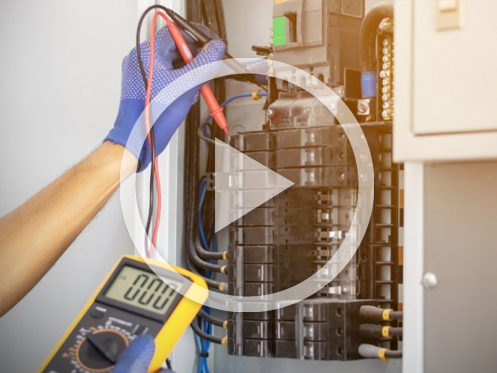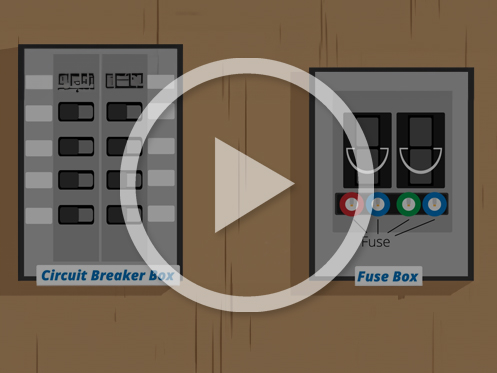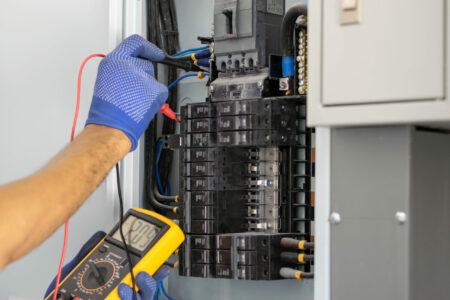Updated January 18, 2024
A home standby generator can be a great addition to your house. This unit is wired into a home’s electrical system and will automatically supply electricity to the residence whenever a blackout occurs. While your neighbors are sitting in the dark, a home generator will allow you to turn the lights on, keep the food in your refrigerator cold, and even run your heating or air conditioning. That is, as long as you make sure to choose a generator that is large enough to power your home effectively. You also don’t want to opt for a much too big generator since this will be a waste of money. This guide will show you the different factors you should consider when choosing a home generator to ensure the unit is exactly the size you need.
Calculating Your Energy Usage Requirements
A home standby generator won’t always need to simultaneously power everything in your house. Most units can be paired with an electronic controller to allow you to prioritize only the appliances and other things you must have at that moment. This is called load management, which we’ll cover in more depth.
Load management helps ensure that everything you need to use has power without potentially overloading the generator and causing it to shut down. Nonetheless, you still want to ensure that the generator always has sufficient power to run your lights, heating or air conditioning, refrigerator, and all the other essential things simultaneously. The easiest way to do this is to write a list of everything you think you may need to power during a blackout. It would be best to find out how many watts of electricity each thing on the list uses per hour. In this way, you can ensure that your generator isn’t undersized.
If you have LED light bulbs, each will use approximately 10 watts per hour. Of course, you typically won’t need to have all the lights on in your home at once, so you should focus predominantly on the things that use the most energy and are the most important. This would include your refrigerator and freezer to ensure your food doesn’t spoil. If your power is out for a long time, you’ll probably want to ensure that at least your primary TV still has power, and it should also go on the list. If you have an electric cooktop or oven, you’ll want to estimate at least how much energy that requires.
If you have an outdoor hot tub filled in the winter, this should also go on your list. Otherwise, you will probably need to drain it to prevent it from freezing if the power goes out for an extended time in the winter. Your hot tub isn’t necessary, but it’s something to consider to ensure it doesn’t get ruined. Anyone who owns an electric vehicle may also want to factor in their EV charging station since many public charging stations don’t have backup power and won’t work in a blackout.
Evaluating Your HVAC System
In homes with a central AC, heat pump, or ductless mini-split, you should focus on how many watts the HVAC unit requires. This is because HVAC units generally use much more power than anything else in a typical home other than a hot tub. The other exception is if your home has any electric heating. This will also require lots of power. No matter what type of heating system you have, you need to choose a powerful generator to keep the system running, or your pipes could quickly end up freezing if a severe winter storm knocks the power out.
You don’t necessarily need to ensure you can run your air conditioning during a blackout, but it will help keep your home more comfortable. It’s also a good idea if you lose power during scorching weather. Otherwise, your home could get dangerously hot and put you at risk of heat stroke.
When evaluating the energy needs of your HVAC system, you should always focus on how much power the system uses when starting up. Most HVAC units draw around three times as much electricity when turning on compared to what they use when running. If your home has a 3-ton AC or heat pump, it typically uses between 2.4 and 3.3 kilowatts per hour (2,400 to 3,300 watts) when running, depending on how energy efficient it is. The HVAC blower will also usually use around 0.5 kWh. However, a system this size typically draws around 9 to 12 kWh when first starting up. Consequently, you’d normally want a 14-kWh generator to ensure the HVAC system can start without removing power from almost everything else in the home.
Managing Energy Loads
Your generator will always need to produce at least a bit more energy than your HVAC system needs to start. Nonetheless, load management can allow you to get away with a slightly smaller generator than you’d otherwise need if it had to power everything in your home simultaneously. You can prioritize certain things in the house by connecting an electronic controller to the automatic transfer switch that controls the generator. This allows you to set it up so that not everything in your home tries to start up simultaneously because this would likely overload the generator.
In most cases, the electronic controller will be programmed so that the HVAC system turns on first and has the highest priority. Once the system is running, the generator typically sends power to your refrigerator, and whatever else is a higher priority. The HVAC system will normally turn on two or three times an hour. Each time the system needs to start, the controller can temporarily divert power from the lower-priority things to ensure the generator can easily supply the additional electricity required for the HVAC system to turn on.
You’ll need an electrician to install the generator, connect it to your electricity system, and program it to ensure the unit continuously powers everything you need. The first step is to have the electrician perform a load calculation, which means evaluating your home and its energy needs to determine the best generator size. The team at Golden Rule can help with this because we offer expert home generator installation services.
When you’re looking to install a home generator, our electricians will help you determine what size unit you need and which option will best meet your energy requirements. We can then maintain your generator and handle any repair needs as they arise. Our team can also help if you need any other electrical services or plumbing, heating, or air conditioning services. For more information on your home generator options, call us today.
Contact Us Today for Electrical Service!
If you found this post helpful, learn the benefits of residential electrical inspections:



